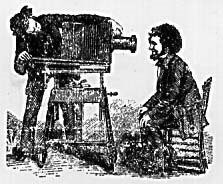In A Cultural Studies Reader, Munns and Rajan discuss the beginnings of cultural studies in Britain, stating that "all the standard accounts of British cultural studies trace its origins to the 1950s and to the emergence of three key texts" (Munns and Rajan 149). Using these texts as the foundation of British cultural studies, Munns and Rajan highlight the development of the field through the 1990s.
1) Term from New Keywords: Representation
Both New Keywords and Introducing Cultural Studies discuss the importance of representations to the study and understanding of cultural studies. In New Keywords, Freadman states that "representations stand for their objects in some sense, but 'standing for' is a contested expression. If an object needs a representation, then it is part of that logic that the representation is not its object; but if the representation is different from its object, how can it truly stand for it?" (Freadman 307). This view of representation forces us to consider and scrutinize the value and meanings of representations in cultural studies.
2) Wikipedia link: Richard Hoggart
http://en.wikipedia.org/wiki/Richard_Hoggart
Richard Hoggart is credited in both texts with giving "cultural studies its first identifiable, intellectual shape" (Sadar and Loon 27).
3) Link to outside source:
http://www.marxists.org/archive/hallas/works/1993/10/thompson.htm
This site provides a more detailed history of E.P. Thompson's life, concluding with Thompson's great work, The Making of the English Working Class.
announcements
This blog was created by and for students in an Introduction to Cultural Studies class at the University of Washington. Through an investigation of urban experience and representation--in theory, in graphic novels and in our own "readings" of Seattle's University District--we considered the formation and history of cultural studies as an (anti)discipline, with a special emphasis on the questions, "What does cultural studies do, and how do you do cultural studies?"
If you'd like to know more about the class, the blog or our U-District artifact project, please contact Gabrielle Dean: gnodean@u.washington.edu.
If you'd like to know more about the class, the blog or our U-District artifact project, please contact Gabrielle Dean: gnodean@u.washington.edu.
Subscribe to:
Post Comments (Atom)
blog archive
-
▼
2008
(92)
-
▼
April
(35)
- Identity in City of Glass
- History of Origins: Race Studies
- History of Origins: Gender Studies
- History of Origins: Gender Studies
- History of Origins: America
- History of Origins: Race Studies
- History of Origins: Gender Studies
- History of Origins: Race Studies
- History of Origins: Race Studies
- History of Origins: Media and Science
- History of Origins: Media and Science
- History of Origins: Gender Studies
- History of Origins: Media and Science
- History of Origins: European Theory
- History of Origins: European Theory
- History of Origins: European Theory
- History of Origins: European Theory
- History of Origins: European Theory
- History of Origins: America
- History of Origins: European Theory
- History of Origins: America
- History of Orgins: European Theory
- History of Origins: European Theory
- History of Origins: Great Britain
- History of Origins: Great Britain
- Cultural Studies in Britain
- Cultural Studies in Britain
- History of Origins: General
- History of Origins: General
- History of Origins: General
- History of Origins: General
- "Orientalism"
- Are You an Author?
- "Paris, Capital of the 19th Century"
- READING: A WEB MODEL
-
▼
April
(35)

No comments:
Post a Comment